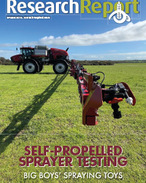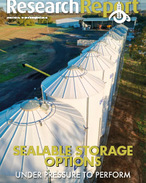This article is 2 years old. Images might not display.
A molecule initially developed to treat tuberculosis, which failed to progress out of the lab as an antibiotic, has been adapted to effectively kill annual ryegrass and wild radish, without harming bacterial and human cells.
Adelaide University's Herbicide and Antibiotic Innovation Lab scientists discovered its promise as a herbicide after noticing similarities between bacterial superbugs and weeds at a molecular level. They were able to chemically modify the structure of the failed antibiotic to block the production of amnio acid lysine, which is essential for weed growth.
University of Adelaide's Waite Research Institute lead research Dr Tatiana Soares da Costa said with many weeds now resistant to existing herbicides on the market, this discovery is a potential game changer for farmers.
"Using failed antibiotics as herbicides provides a short-cut for faster development of new, more effective weed killers that target damaging and invasive weeds that farmers find hard to control," said Dr Soares da Costa.
"The short-cut strategy saves valuable time and resources, and therefore could expedite the commercialisation of much needed new herbicides.
"It's also important to note that using failed antibiotics won't drive antibiotic resistance because the herbicidal molecules we discovered don't kill bacteria. They specifically target weeds, with no effects on human cells."
Dr Soares da Costa and her team are now looking at discovering more herbicidal molecules by re-purposing other failed antibiotics and partnering up with industry to introduce new and safe herbicides to the market.
This research has been published in the journal of Communications Biology.























